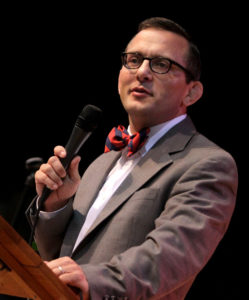
Are all Christian schools created equal when it comes to the spiritual formation of kids? Our guest, Dr. Tim Dernlan, researched this important question and gathered the hard data to prove a difference between classical Christian schools and non-classical, or modern, Christian schools. Tune in to hear the results of this rigorous doctoral study…and what this means for you when choosing a school!
 Dr. Timothy Dernlan serves as the Head of Schools for Reach Christian Schools where he leads four distinct PK-12 Christian schools partnering together to serve over 1,000 students. Dr. Dernlan earned a Bachelor of Arts in Education and Communication at Purdue University, a Masters of Education in Educational Leadership at Lehigh University, and a Doctor of Education in Leadership Studies at Ashland University.
Dr. Timothy Dernlan serves as the Head of Schools for Reach Christian Schools where he leads four distinct PK-12 Christian schools partnering together to serve over 1,000 students. Dr. Dernlan earned a Bachelor of Arts in Education and Communication at Purdue University, a Masters of Education in Educational Leadership at Lehigh University, and a Doctor of Education in Leadership Studies at Ashland University.
Dr. Timothy Dernlan is a visionary leader and is passionate about advancing Christian community and culture through education. He taught theater, math, rhetoric, physical education, personal finance, communication, leadership, and systematic theology before turning his focus to school leadership.
Much of his early life was influenced by the sport of wrestling. He won All-American honors while at Purdue University, represented the United States as an athlete around the world, and competed in the 2000 and 2004 Olympic Trials. He coached at Purdue, Ohio State, Penn State, Lehigh, and Ashland and was named the NCAA Midwest Region Coach-of-the-Year in 2008.
Dernlan and his wife were married in 2000 and have four children.
Evidence That Classical Christian Schools Excel at Spiritual Formation – Dr. Tim Dernlan
– Sherlock Holmes in A Scandal in Bohemia
BaseCamp Live guest, Dr. Tim Dernlan, sounds more like an investigator than a Head of School. Putting on his Sherlock cap, Dernlan gathered and analyzed critical data to determine if Christian schools make a difference in the spiritual lives of students.
Comparing classical Christian w/ non-classical Christian schools
Specifically, he wondered if students who attend classical Christian schools are better at retaining long-term faith after graduation than students of non-classical or “modern” Christian schools.
The bottom line: Are all Christian schools the same when it comes affecting students and their spiritual formation? What he found surprised him.
How do you measure spiritual formation in a scientific study?
Three areas measured: knowledge, belief and action
The desire to live like a Christian is higher in the Classical Christian school
The data revealed various differences and trends as students transitioned to higher grades.
Surprisingly, fourth graders showed a higher commitment to the Christian faith in modern Christian schools. By the time they entered 12th grade, the trend line went down in modern Christian schools and up in classical schools where almost 100% of students reported a strong faith in Christ and a desire to live like a Christian.
According to Dernlan, this finding suggests,“How important it is to stay through 12th grade and not leave in 8th grade; if you make it through the logic stage, and you leave, then you leave before it’s all put back together.”
Additionally, when asked how often their teachers talk about faith and God, the trend was up in classical schools and down in modern Christian schools. These results correlated strongly to the student’s responses about their faith.
Seventy percent of students in classical Christian schools reported that their parents were the #1 influencers of their faith compared to thirty percent of students in non-classical schools. The findings may suggest that CCE schools are better at supporting parental authority, as well as encouraging non-parental mentors.
The data shows…classical Christian schools excel at spiritual formation
Dernlan’s data goes a long way to show that Classical Christian Schools help students go the distance spiritually and that modern Christian schools are not as effective.
While we might be tempted to agree with the Austrian physicist Ludwig Bolzman who said that, “There is nothing so practical as a good theory,” we know better. In the spirit of Sherlock, our theories must fit the facts, not the other way around.
Even then, because our ultimate standard is Scripture, and all science is under its authority, Dernlan acknowledges in his book that, “Faith formation comes from the work of the Holy Spirit and cannot be fully measured by a survey or produced by the work of people.” (Pazmino, 2010)
